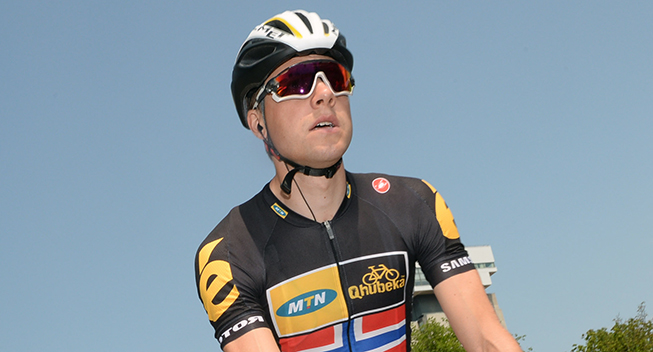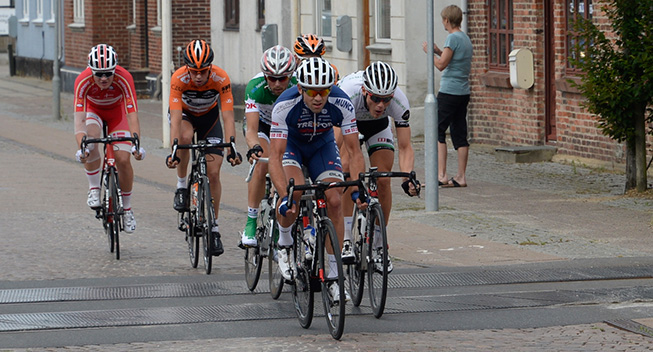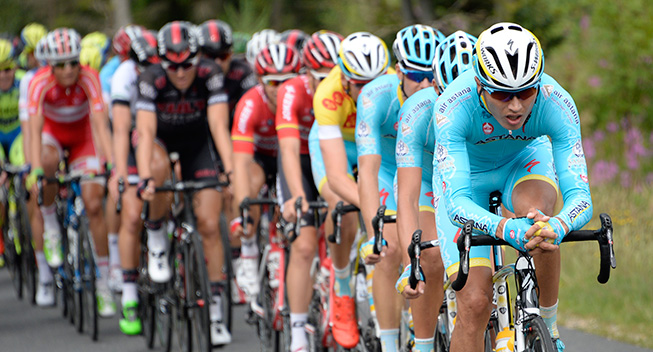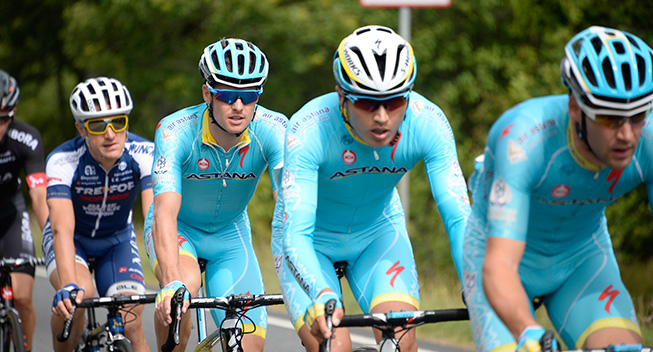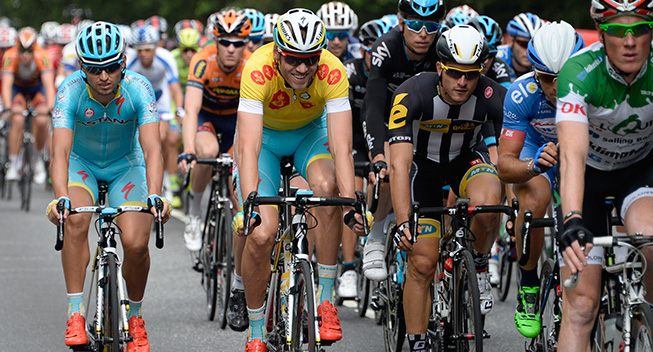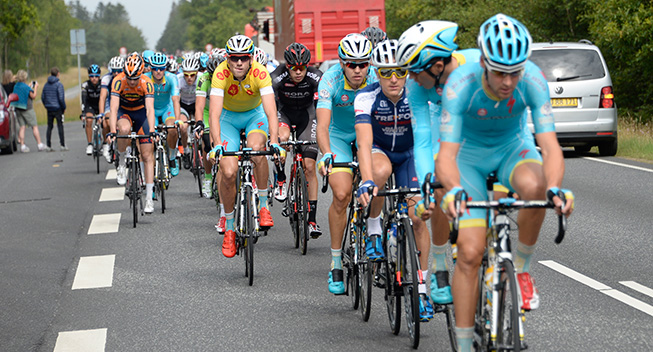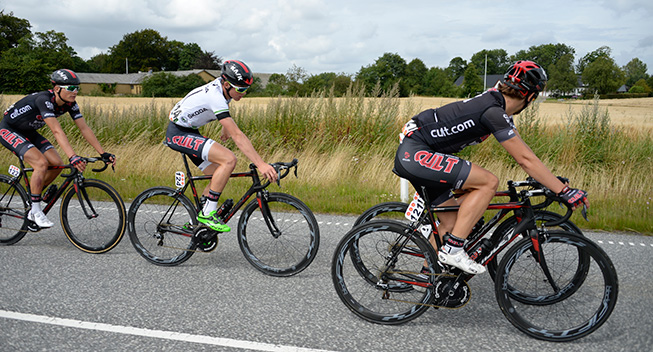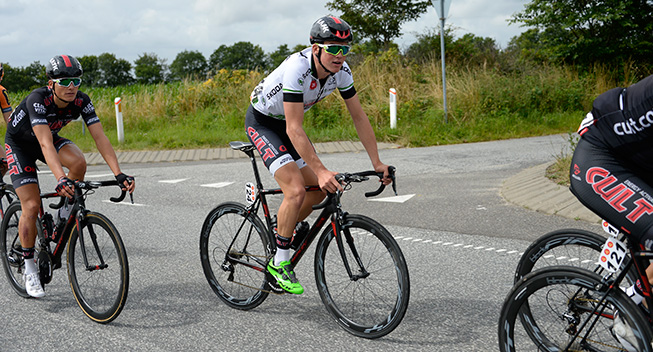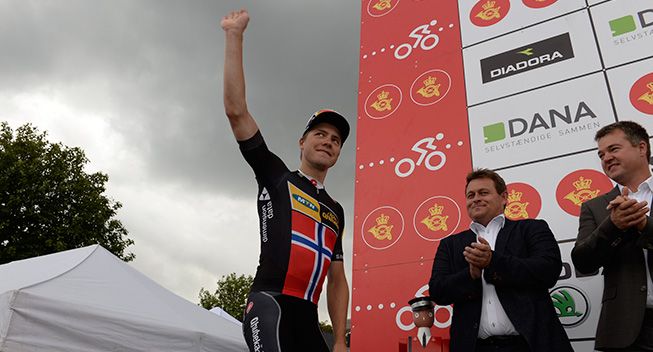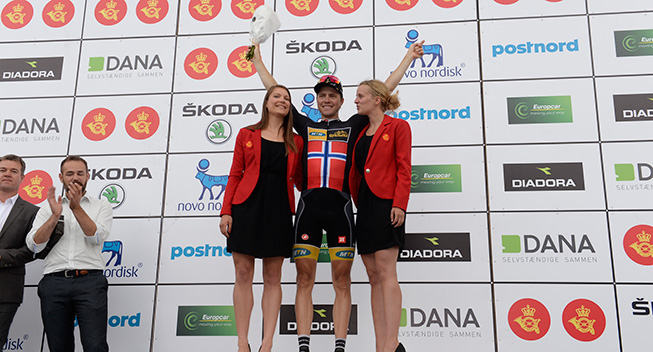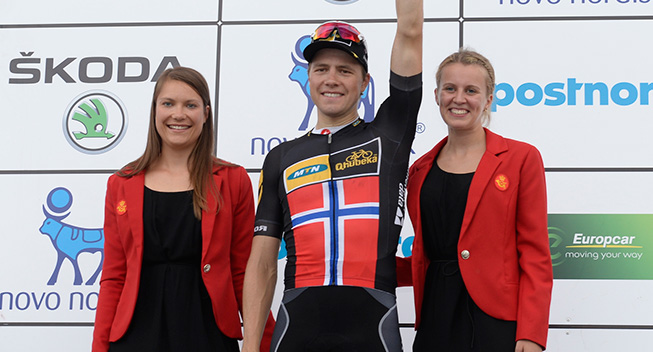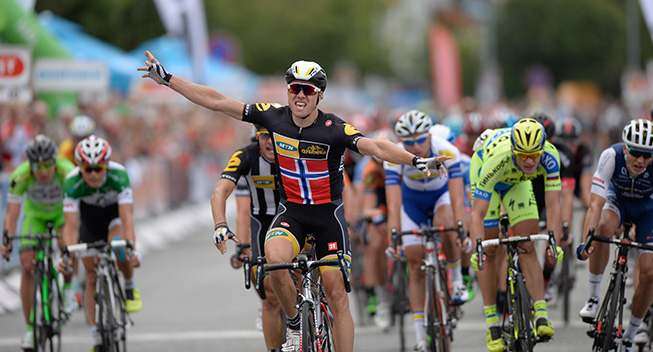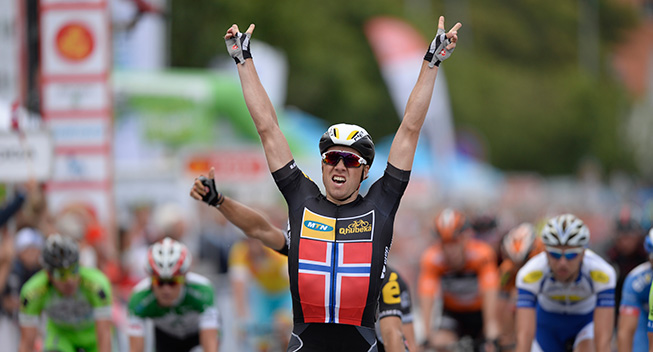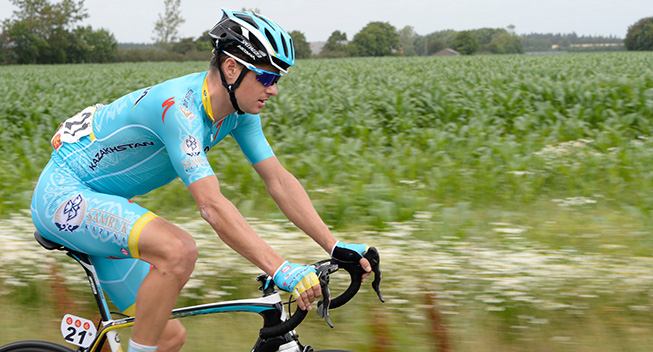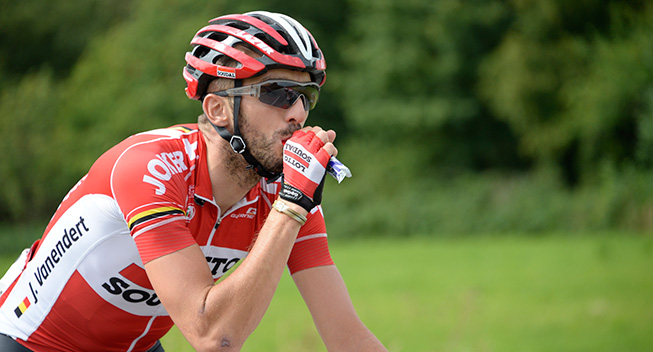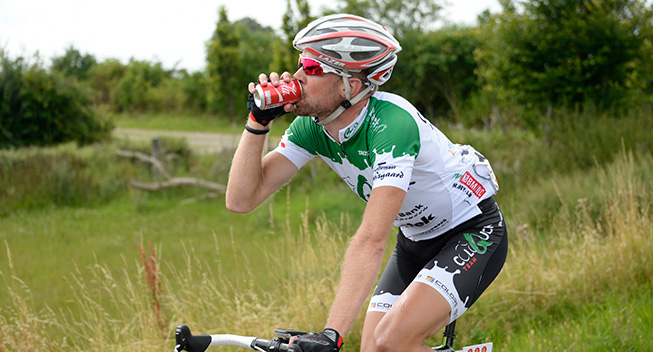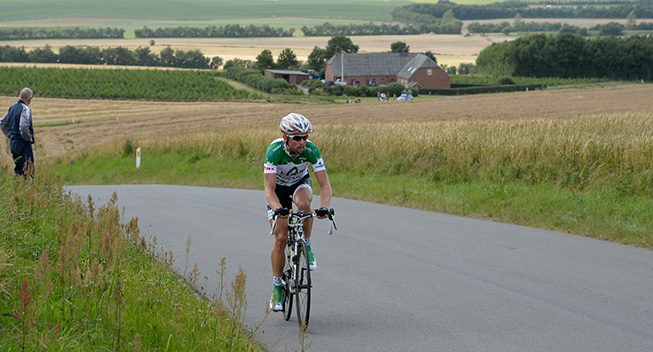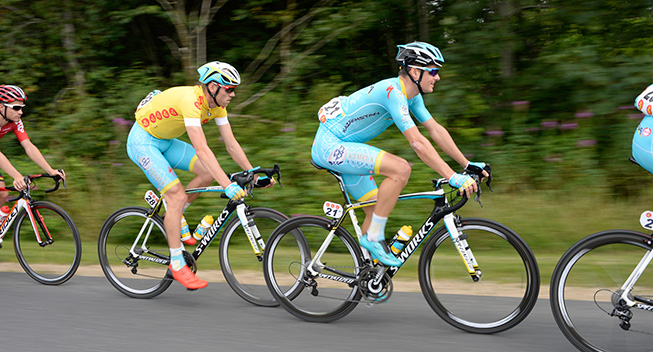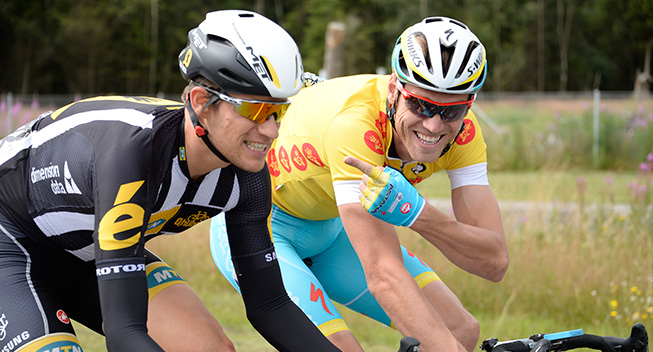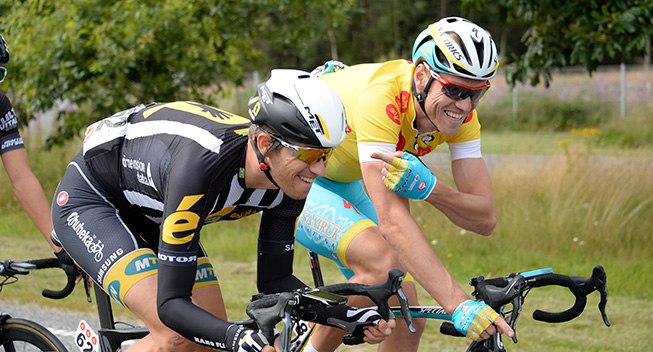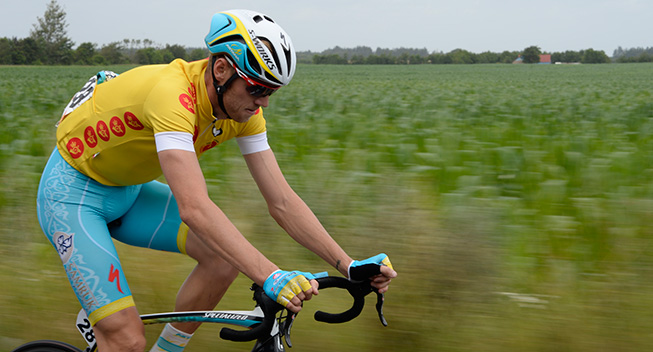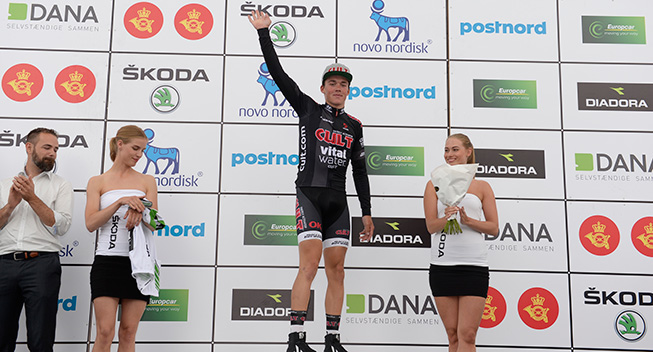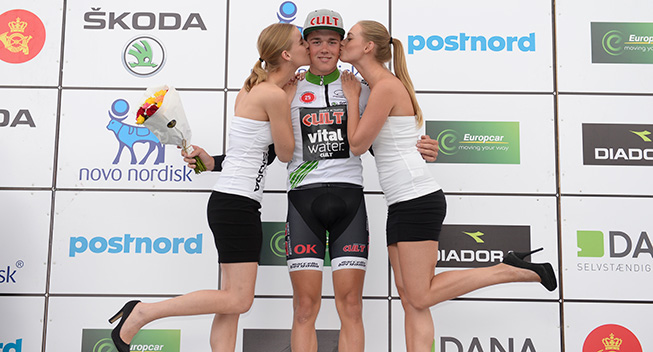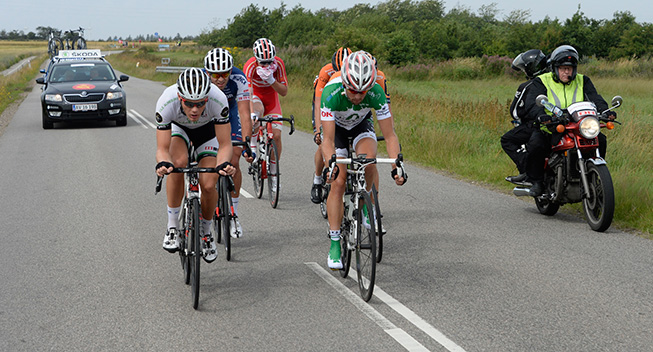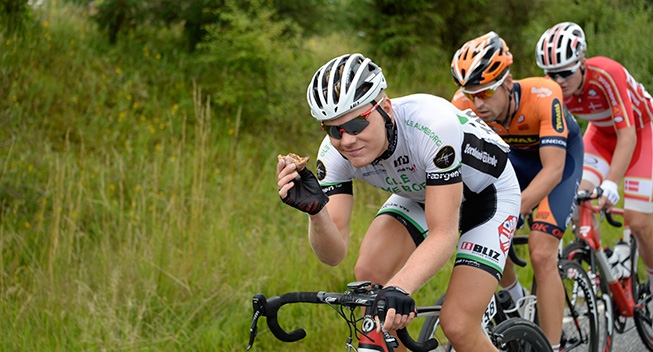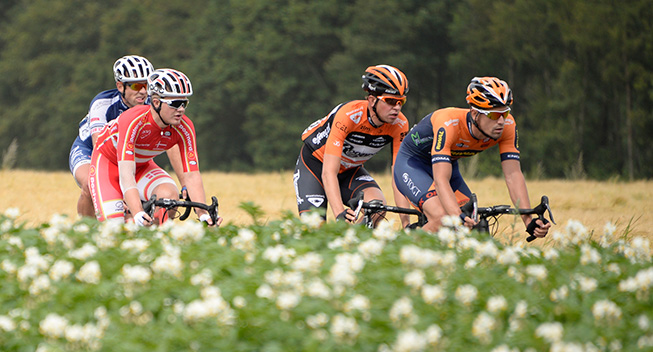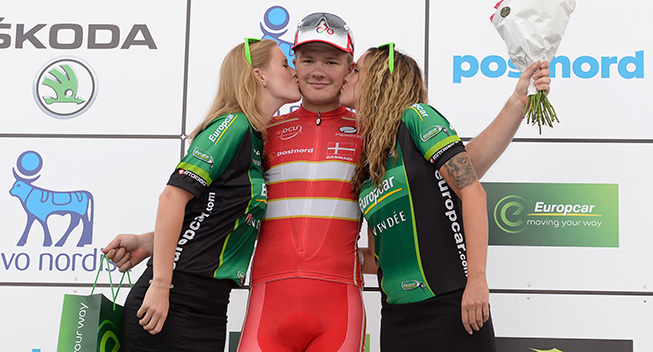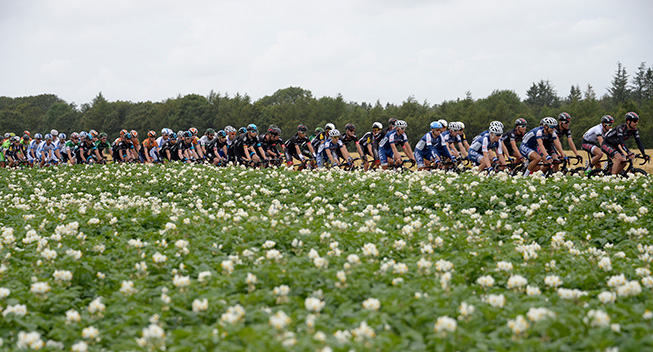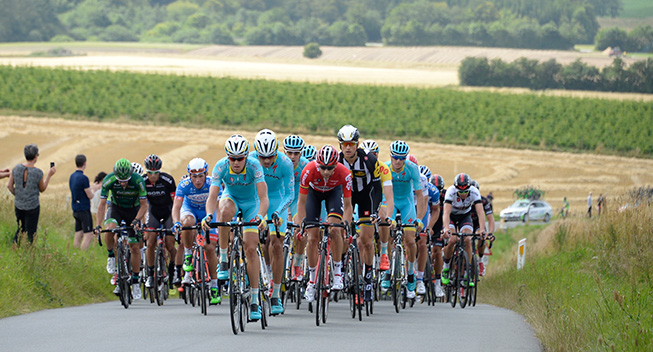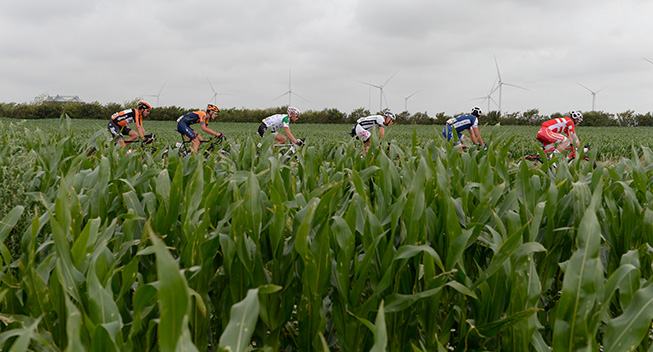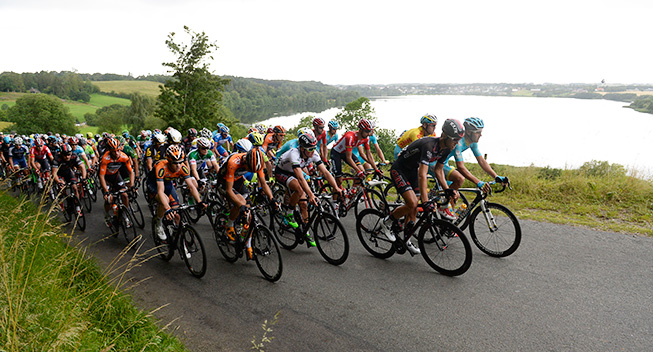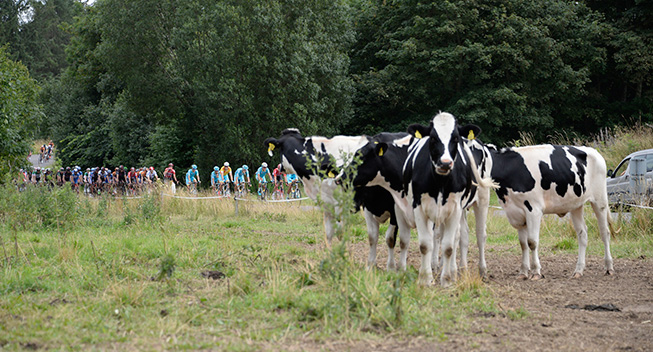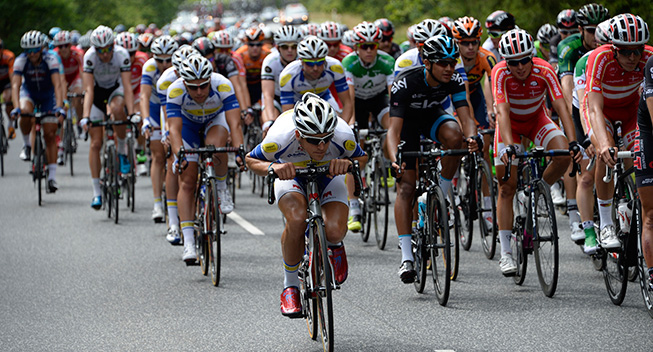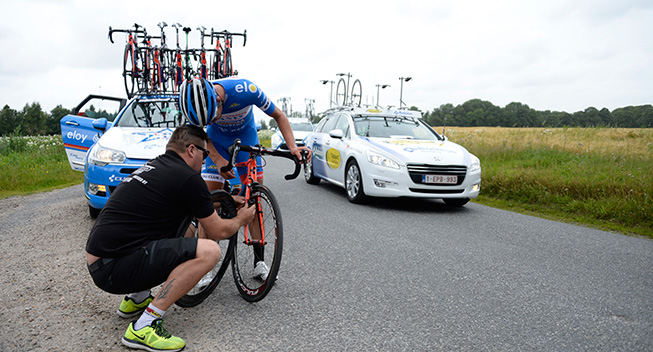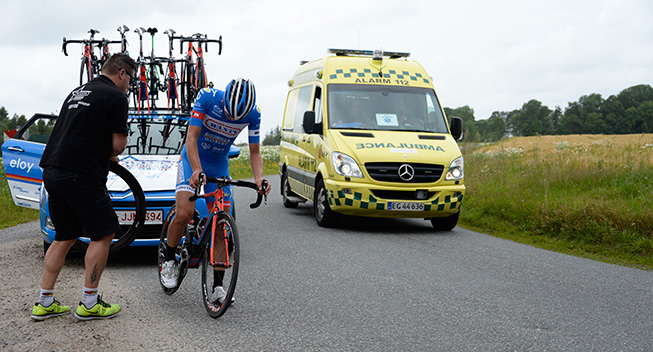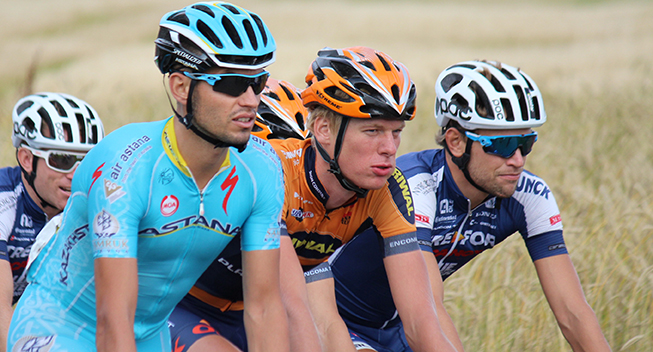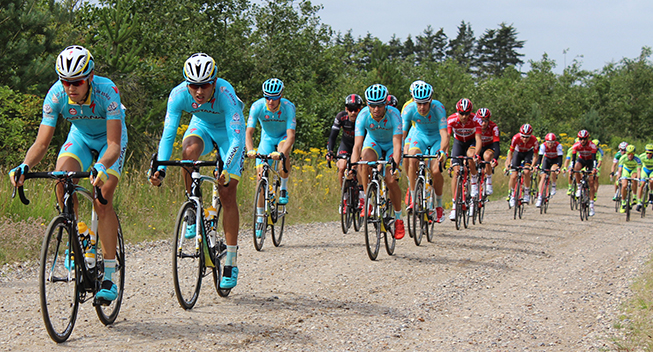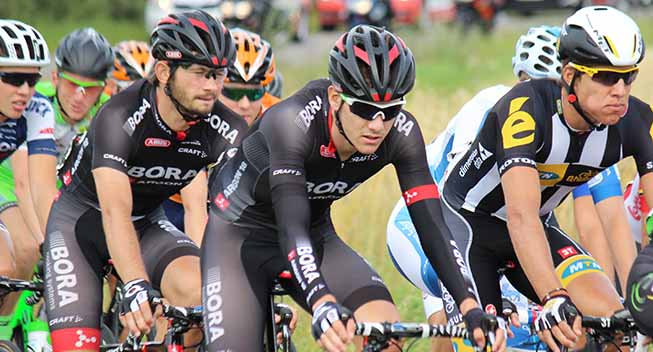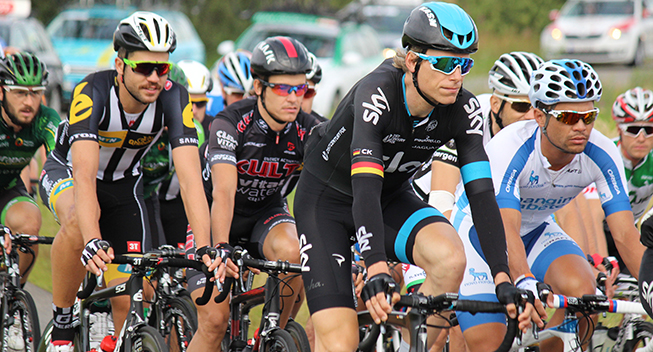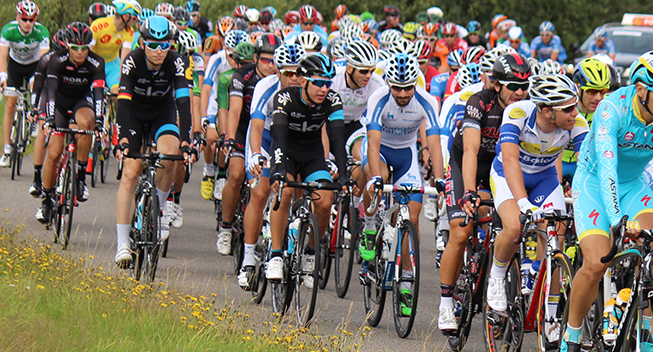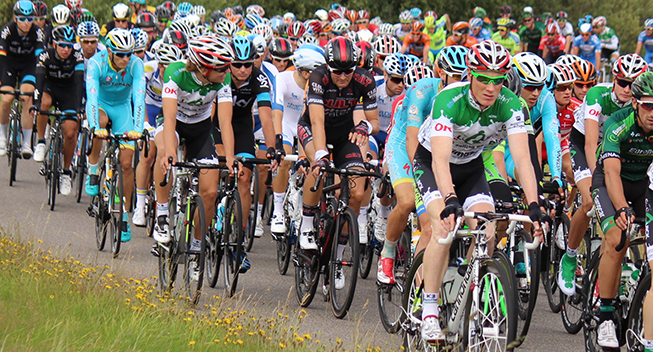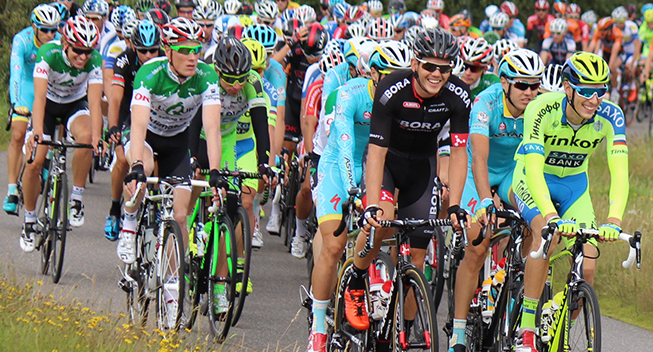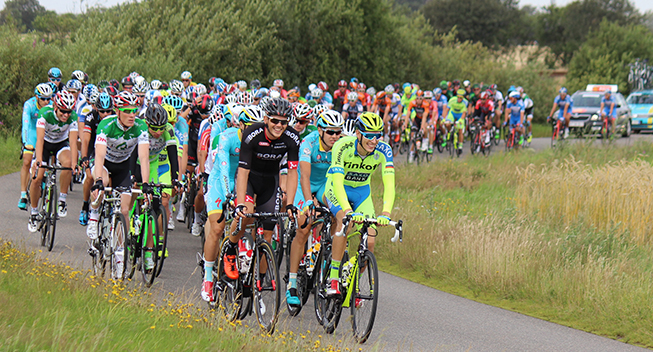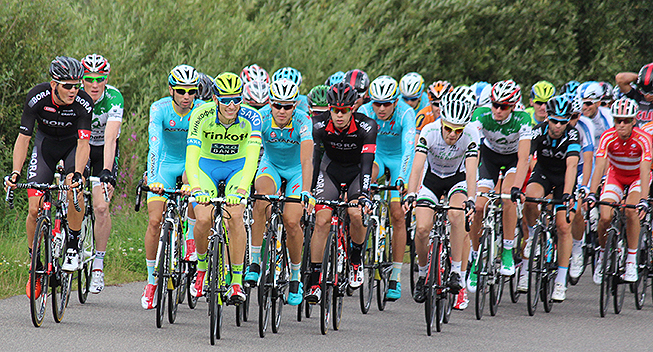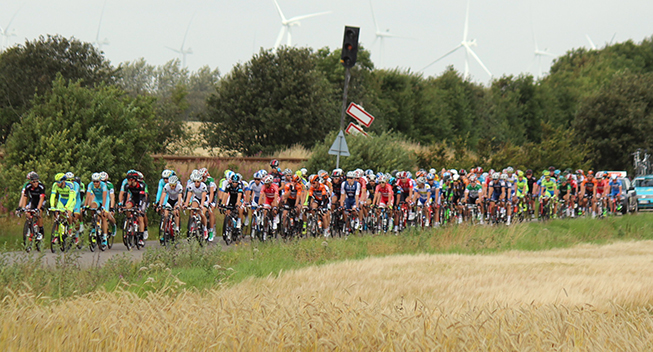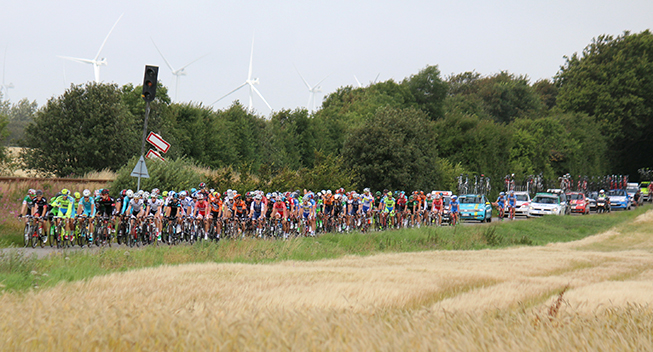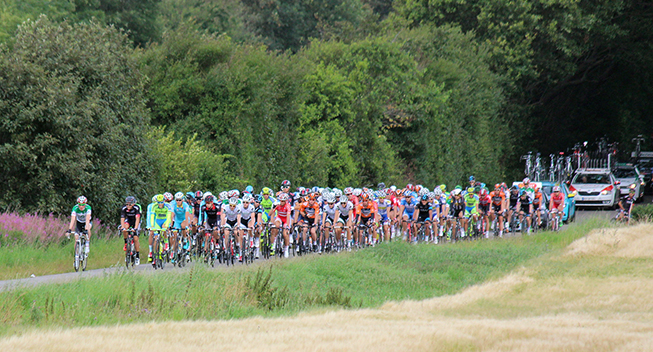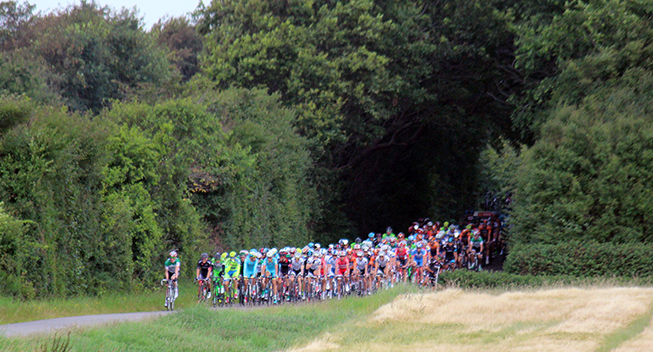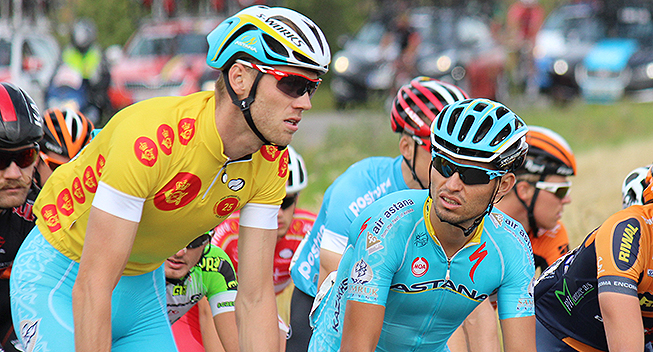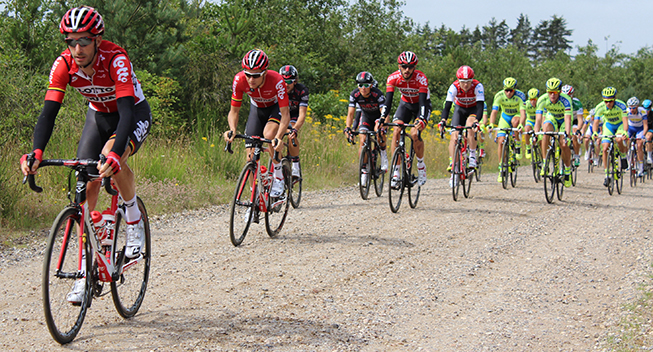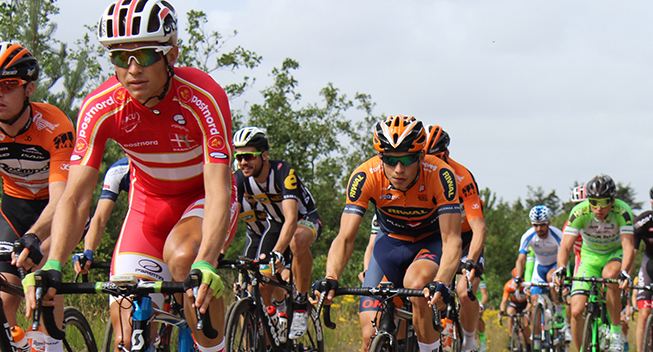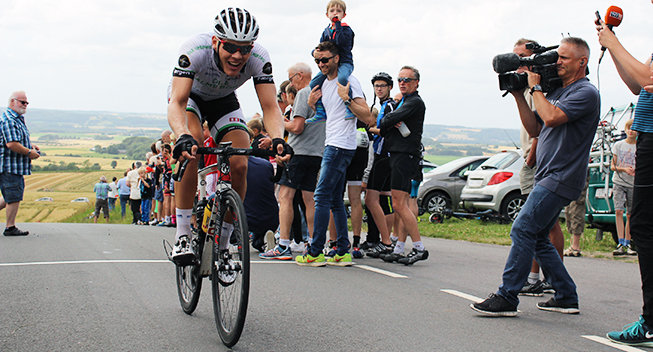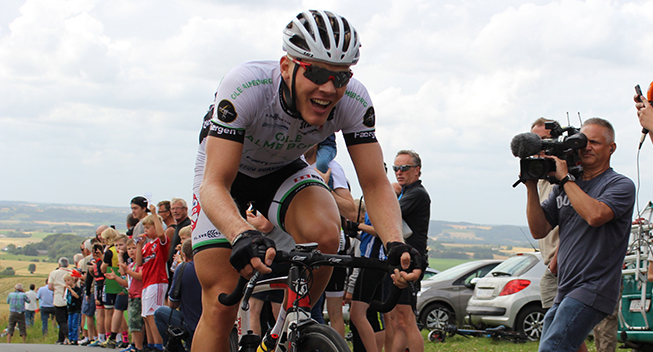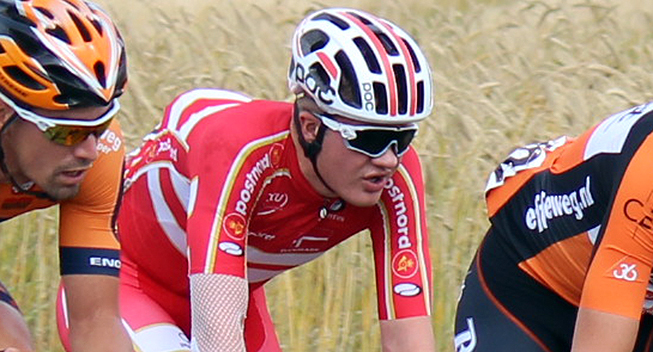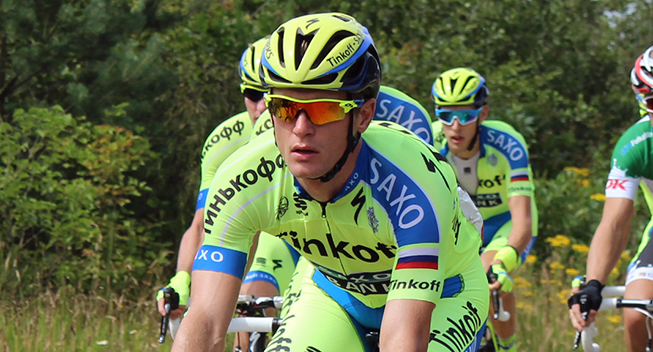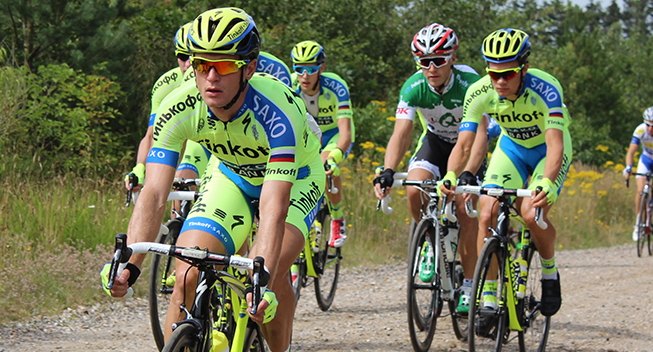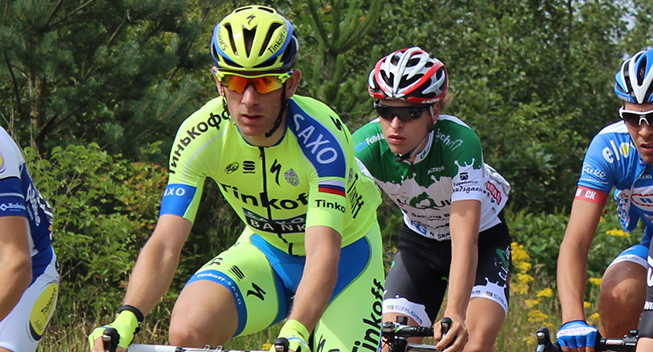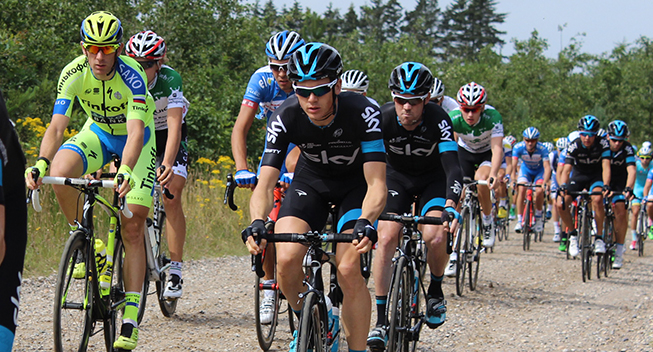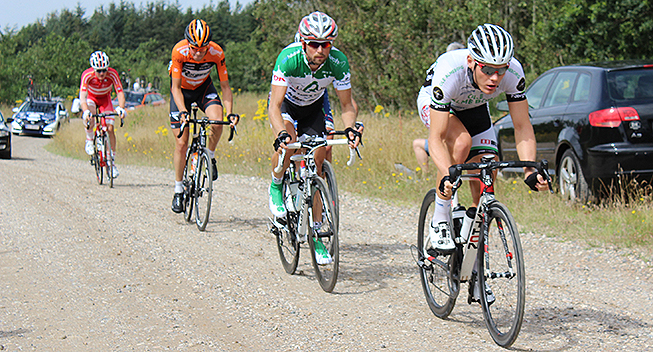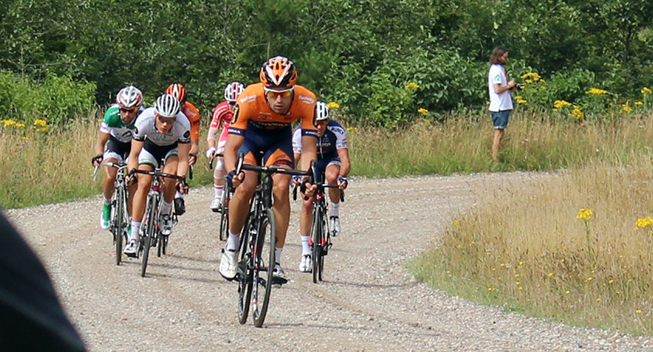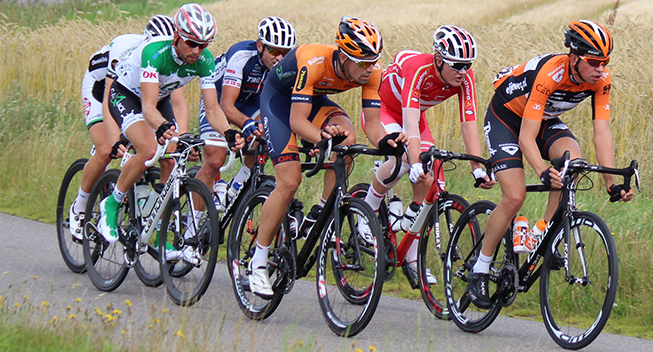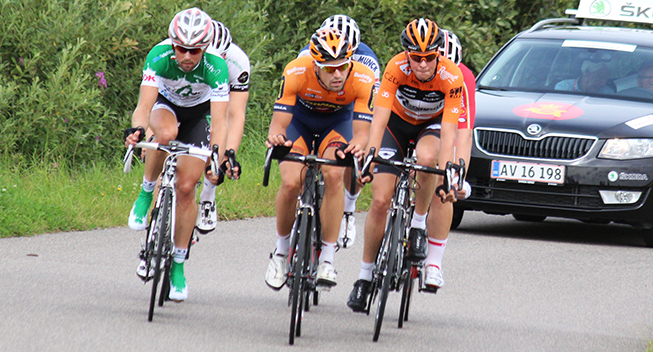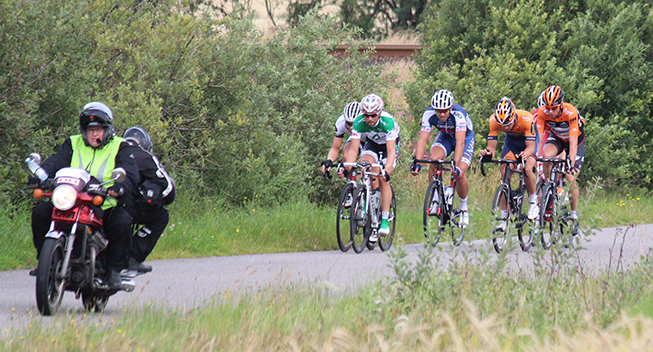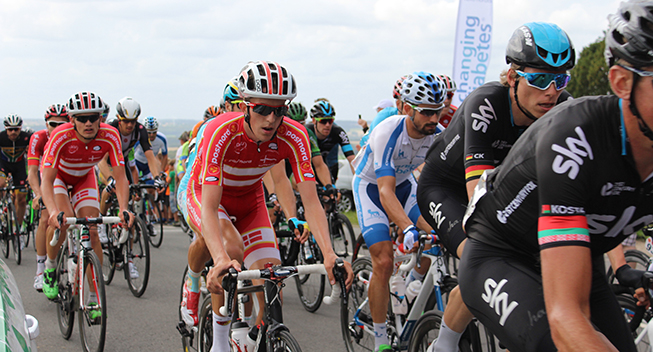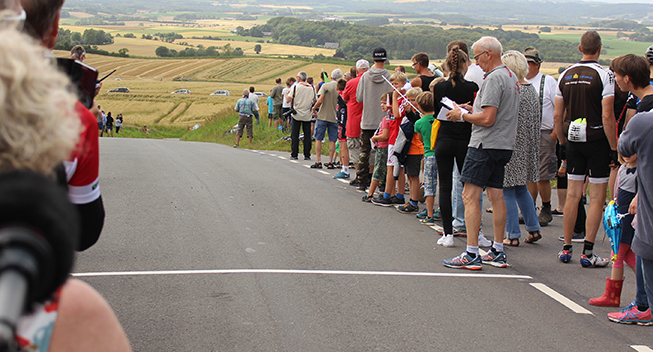Edvald Boasson Hagen (MTN-Qhubeka) made up for yesterday’s disappointment when he came out on top in the bunch sprint that decided the second stage of the Tour of Denmark. After his teammate Gerald Ciolek had neutralized a late attack from Magnus Cort (Denmark), he powered down the finishing straight to take a dominant victory and as his teammate Kristian Sbaragli was glued to his wheel, it was a 1-2 for MTN-Qhubeka. Lars Boom (Astana) defended the overall lead.
Going into the Tour of Denmark, many pointed to Edvald Boasson Hagen as the favouite but the Norwegian got his race off to the worst possible start in yesterday’s wet opener. He missed the key break of six riders that escaped in the finale and so lost more than 30 seconds to some of his biggest rivals.
However, Boasson Hagen has bounced back in the best possible way by coming out on top in today’s second stage of the race. To make things even better, his teammate Kristian Sbaragli finished second and so made it a memorable day for MTN-Qhubeka.
After a very aggressive race, things were back together when they started the first lap of the 4.5km finishing circuit that included a small hill before it descended to a flat final kilometre. Astana were trying to control the race for leader Lars Boom and it was Laurens De Vreese and Arman Kamyshev who tried to prevent anyone from attacking. That was no easy task as Martin Mortensen (Cult) and Floris De Tier (Topsport Vlaanderen) took off as soon as they hit the climb.
The pair got a small advantage while Björn Thurau (Bora-Argon 18), Kanstantsin Siutsou (Sky) and Rasmus Mygind (Riwal) took off in pursuit. The former fell off the pace while the latter two joined the leaders.
Astana were now short on manpower and it was Valerio Agnoli who was left to do all the work. However, MTN-Qhubeka showed their intentions and helped to bring the break back just after they had crossed the line to start the second lap.
The attacking continued on the climb when a Roompot rider got clear. Christoph Pfingsten (Bora-Argon 18), Tosh van der Sande (Lotto Soudal) tried to join him but now it was Jakob Fuglsang controlling things for Astana. He caught the lone Dutchman as they approached the summit.
This was the signal for Rasmus Guldhammer (Cult) to take and after Enrico Gasparotto (Waty) and Lars Petter Nordhaug (Sky) had failed to join him, he got a gap. As he started the final lap, he was 14 seconds ahead.
MTN-Qhubeka were now chasing full gas with Jaobus Venter while Jacques van Rensburg took over when they hit the final climb. He was unable to prevent Sean De Bie (Lotto Soudal) from escaping though and the Belgian passed the fading Guldhammer.
This was the signal for Matti Breschel (Tinkoff-Saxo) to make his expected move. He passed De Bie but it was a strong Nordhaug who brought it back together at the top.
Magnus Cort (Denmark) used a slowdown to launch a counterattack and he quickly got a promising gap while the peloton took time to regroup after the climb. Linus Gerdemann (Cult) and Boom swung off but things finally got organized when Michael Valgren hit the front for Tinkoff-Saxo.
The Dane chased hard until MTN-Qhubeka took over with 1.5km to go. Gerald Ciolek hit the front and he brought Cort back at the flamme rouge.
Ciolek swung off before Fuglsang hit the front to do a small lead-out for Boom. However, Boasson Hagen was in the perfect position to start his sprint and when he hit the front, the outcome was never in doubt. Sbaragli stayed glued to his wheel to take second while Søren Kragh Andersen (Trefor) completed the podium.
Boom scored three bonus seconds in an intermediate sprint and so extended his overall lead over Lars Bak (Lotto Soudal) to 9 seconds. He will try to defend it in tomorrow’s queen stage which is the hardest in the history of the race. The course is up and down all day and ends with four laps of a tough circuit that includes a 22% climb that summits just 1km from the finish in Vejle.
A long stage
After the surprise outcome of the opening stage, it was time for slightly hillier terrain in stage two which brought the riders over a massive 234km from Ringkøbing to Aarhus. After a relatively flat first halp, the riders would face four categorized climbs in the second part before they got to the 4.5km finishing circuit that they would cover thrice. It included a small climb before the riders descended for the final 2.5km.
Unlike yesterday it was a dry day in Denmark when the riders gathered for the start of the unusually longs second stage of the race. All riders who finished yesterday’s stage were present as they headed out for their neutral ride.
Six riders get clear
Yesterday’s stage had gone off to a brutally fast start and today it was again an attacking opening part. After 2km of racing, 6 riders managed to get clear and after another 6 riders bridged the gap, it was a 12-rider group that took off. However, it was all back together at the 4km mark.
The next attack was the one that worked as Brian van Goethem (Roompot), Jesper Odgaard (Coloquick), Mathias Westergaard (Almeborg), Nikola Aistrup (Riwal), Mathias Krigbaum (Denmark) and Alex Rasmussen (TreFOR) escaped. After 7km of racing, they had an advantage of 35 seconds and as the peloton slowed down, they quickly increased the gap. At the 12km mark, it was 2.25 and 8km later it had gone out to 7.25.
Astana take control
Astana decided that it was time to take control and they kept the gap stable at around 7.30 before they slowly started to bring the break back. MTN-Qhubeka also decided to lend a hand.
As they approached a small gravel road, the peloton got a lot more nervous and this brought the gap down to 5.55 when they were back on the tarmac. A few riders had mechanicals but they were able to rejoin the bunch relatively quickly.
The gap comes down
Astana and MTN-Qhubeka kept the gap at around 6 minutes before they again upped the pace. At the 70km mark, it was already down to 4.20 where it was kept stable for a while.
At the 100km mark, the gap was only 3.25 but the feed zone allowed the escapees to increase their advantage to 4.05. The peloton went back to work after the lunch and when they got to the first KOM sprint, the gap was 3.25.
A fight for KOM points
Van Goethem attacked from the front group and was joined by Odgaard and Westergaard. Those three riders built an advantage of 15 seconds before Westergaard won the sprint ahead of van Goethem and Odgaard. Aistrup crossed the line in fourth.
Westergaard continued his solo attack and also won the second KOM sprint while van Goethem was again second, followed by Aistrup and Odgaard. The Dutchman joined the lone leader and they had an advantage of 1.20 over their chasers and 4.10 over the peloton at the 140km mark.
The peloton accelerates
The chasers were slowly getting back to the leaders while the peloton continued to lose ground until Astana suddenly accelerated furiously. At the 150km mark, the peloton had reduced their deficit to just 3 minutes while the chasers were at 40 seconds.
After 160km of racing, the two front groups merged but Astana continued to ride hard in the peloton. With 75km to go, the gap was only 55 seconds but the Kazakhs decided to stop their acceleration and while Daniil Fominykh (Astana) and Dennis Vanendert (Lotto Soudal) set a steady pace, the gap slowly started to grow.
Kriegbaum takes off
Meanwhile, the attacking had started in the front group when Kriegbaum launched an attack. Van Goethem and Westergaard briefly lost contact but it came back together.
Odgaard tried a move on a small hill but it was the counterattack by Kriegbaum that had an effect. No one was able to follow the young Dane who quickly got a big gap.
Kriegbaum wins the KOM sprint
With 65km to, Kriegbaum had extended his advantage over the peloton to 2.25 and Bardiani had started to work with Fominykh and Vanendert. Meanwhile, Rasmussen had been dropped from the chase group and he was caught with 60km to go.
Kriegbaum won the fourth KOM sprint while Aistrup beat Westergaard and van Goethem in the sprint for second. However, the chasers were quickly losing ground to the peloton in which Bardiani, Astana and Lotto Soudal had significantly upped the pace.
The chasers are caught
With 55km to go, the chasers were nearly caught and even though Aistrup tried to keep his chances alive by attacking again, they were brought back just as they hit a small climb. At this point, Kriegbaum was just 1.10 ahead of the peloton.
A Europcar rider and Jay McCarthy (Tinkoff-Saxo) launched an immediate counterattack but Bardiani reacted strongly and made sure that things calmed down again. Fominykh went back to work and slowly approached Kiregbaum who was just 40 seconds ahead with 53km to go.
Halvorsen takes off
Three kilometres later the gap was down to just 25 seconds and this prompted Emil Halvorsen (Riwal) to attack. The Dane quickly bridged the gap to Kriegbaum who exploded completely and sat up to wait for the peloton which was still led by Fominykh.
When Halvorsen had an advantage of 20 seconds, Michel Kreder (Roompot) and Charles Planet (Novo Nordisk) attacked and they quickly caught Kriegbaum who decided to give it another go. However, the peloton had slowed completely down and was content to let the new escapees ride away.
Halvorsen waits for his chasers
With Kreigbaum hanging on for dear life, Planet and Kreder worked well together to slowly get back to Halvorsen. With 40km to go, they were just 15 seconds behind while the peloton had slowed down and been distanced by a minute.
Halvorsen wisely decided to wait for his chasers and so it was a four-rider front group that was formed with 38km to go. At this point, they had an advantage of 50 seconds but they were losing ground as Astana had gone back to work with a strong Laurens De Vreese. Halvorsen beat Kriegbaum and Planet in the first intermediate sprint.
Lots of attacks
With 35km to go, the gap was only 25 seconds and this inspired more riders to go on the attack. A Topsport rider was the first to try but it was Cult who took control. They launched Martin Mortensen off in an attack and he quickly passed the fading Belgian.
Sean De Bie (Lotto Soudal) and Jakob Fuglsang (Astana) joined Mortensen and later McCarthy and a Coloquick rider also made the junction. The attacking continued and it was Edvald Boasson (Hagen), Michael Valgren (Tinkoff-Saxo) who were the next to make it across.
Kamyshev in control
A big group gathered and they caught the front quartet with 31km to go. However, just as the junction was made, it was all back together.
MortenSEN was relentless and so tried again but he had no luck as Astana were controlling things firmly with Arman Kamyshev. When he was brought back, it was Novo Nordisk rider who took off but Kamyshev easily reeled him in.
Bonus seconds for Boom
The situation calmed down a bit as everyone was looking at each other for a while before Kamyshev started to work again. Moments later Sean De Bie tried to lead Bak out for the intermediate sprint but it was Marco Marcato (Wanty) who went from afar. However, he was passed by Boom who scored tree bonus seconds while McCarthy was third.
A Roompot rider was the next to attack and van der Sande, Norhaug and Mortensen were also part of the action. However, Kamyshev neutralized the attack and instead it was Valgren, Pim Ligthart (Lotto Soudal) and Patrick Clausen (Trefor) who got clear.
More attacks
The trio worked well to get a small advantage but it was mission impossible and with 24km to go, they were brought back. Valgren, Mortensen, van der Sande were all active but had no luck.
Things were looking better for McCarthy who launched the next attack and was joined by Christan Knees (Sky). However Fuglsang was chasing for Astana and with 18km to go it was back together.
Wanty took complete control before they sent Gasparotto off in a counterattack after Valgren had made another move. He was joined by a Bora rider and Dennis Vanendert before Michael Gogl (Tinkoff-Saxo) also made the junction. However, Astana still had De Vreese and Kamyshev on the front and they brought it back together at the first passage of the finish line to set the scene for the aggressive finale.
| Jonathan TIERNAN-LOCKE 40 years | today |
| Sergio FERRARI 46 years | today |
| Anna STEVENSON 43 years | today |
| Bakbergen BAIYRBEKOV 24 years | today |
| Timothy CASSIDY 41 years | today |
© CyclingQuotes.com

